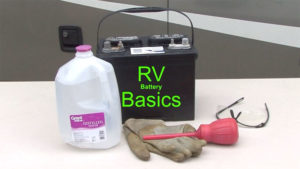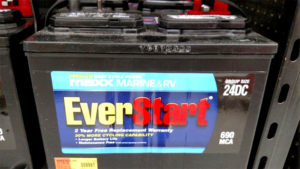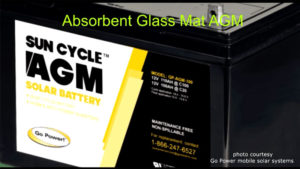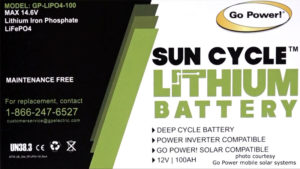rv Education 101
RV Education 101 -Understanding RV Batteries - in Depth
Hi, my name’s Mark Polk, with “RV Education 101.” And today’s topic is everything you need to know about RV batteries. After viewing the video, you should have a better understanding of battery basics, the different types of RV batteries, which type of battery may be right for you, and what you can do to get the maximum life from your RV batteries. Let’s get started right now.
 RV battery basics. To properly maintain and extend the life of your RV batteries, you need to have a basic understanding of what a battery is and how it works. There are numerous types of batteries that can be used in RVs, but the most widely used are deep-cycle lead acid storage batteries. It’s important you use the right battery for the type of application. Deep-cycle batteries have thicker plates than automotive starting batteries. This means deep-cycle batteries are designed to be discharged and recharged repeatedly. They can be discharged and recharged which is one complete cycle hundreds of times before reaching the end of the life cycle.
RV battery basics. To properly maintain and extend the life of your RV batteries, you need to have a basic understanding of what a battery is and how it works. There are numerous types of batteries that can be used in RVs, but the most widely used are deep-cycle lead acid storage batteries. It’s important you use the right battery for the type of application. Deep-cycle batteries have thicker plates than automotive starting batteries. This means deep-cycle batteries are designed to be discharged and recharged repeatedly. They can be discharged and recharged which is one complete cycle hundreds of times before reaching the end of the life cycle.
RV 101 tip: RV batteries should always be deep-cycle batteries. The life cycle of a battery is dependent on how often and how much it is discharged versus how well it is maintained. One of the most important things to understand about RV batteries is you must recharge your battery after using it. When you go camping, you start the trip with a fully charged battery, meaning it is 100% charged. If you are dry camping for three days and nights without any electrical connection, the battery slowly drops from 100% to 90%, 80%, and then 70%. When the trip is over, you must recharge the battery back to 100% so it doesn’t get damaged. When a battery sits in a discharged state, sulfation forms on the plates which is the leading cause for dead batteries. Every RV has a built-in battery charger in the RV’s converter. When you plug the RV into electricity, the battery charger automatically starts recharging the battery. How long it takes to charge the battery depends on what percentage the battery is discharged. Now, I wanna discuss the three most popular battery types used in RVs and which type of battery might be right for you.
The three types are lead acid batteries; absorbent glass mat, or AGM batteries; and lithium batteries. Let’s take a closer look. Types of RV batteries.
 The most common type of RV battery is a deep-cycle lead acid battery. Lead acid batteries get the name because they use lead plates submersed in a mixture of sulfuric acid and distilled water to manufacture the batteries. Car starting batteries have thin lead plates, whereas deep-cycle batteries have thick lead plates. The thicker plates are the reason the battery can be discharged and recharged repeatedly. Battery amp hours. Batteries are rated in amp hours. Amp hours tell you how much amperage a battery can provide per hour. Depending on how you camp, the amp hour rating dictates the size of battery you need. Battery amp hour ratings divided by hours used equal amps available. For example, a 100 amp hour battery divided by 8 hours of use equals 12.5 amps per hour. There are three basic groups or sizes of deep-cycle lead acid batteries: group 24, group 27, and group 31. The larger the number, the larger the battery and the higher amount of amp hours you get from the battery. Group 24 is 70 to 85 amp hours, group 27 is 85 to 100 amp hours, and group 31 is 100 to 125 amp hours. Some RV owners use 6-volt deep-cycle lead acid batteries. The way the batteries are wired and how many batteries are in the battery bank determines how many amp hours you have. RV owners who camp off the grid, using solar panels, typically have large battery banks with lots of amperage.
The most common type of RV battery is a deep-cycle lead acid battery. Lead acid batteries get the name because they use lead plates submersed in a mixture of sulfuric acid and distilled water to manufacture the batteries. Car starting batteries have thin lead plates, whereas deep-cycle batteries have thick lead plates. The thicker plates are the reason the battery can be discharged and recharged repeatedly. Battery amp hours. Batteries are rated in amp hours. Amp hours tell you how much amperage a battery can provide per hour. Depending on how you camp, the amp hour rating dictates the size of battery you need. Battery amp hour ratings divided by hours used equal amps available. For example, a 100 amp hour battery divided by 8 hours of use equals 12.5 amps per hour. There are three basic groups or sizes of deep-cycle lead acid batteries: group 24, group 27, and group 31. The larger the number, the larger the battery and the higher amount of amp hours you get from the battery. Group 24 is 70 to 85 amp hours, group 27 is 85 to 100 amp hours, and group 31 is 100 to 125 amp hours. Some RV owners use 6-volt deep-cycle lead acid batteries. The way the batteries are wired and how many batteries are in the battery bank determines how many amp hours you have. RV owners who camp off the grid, using solar panels, typically have large battery banks with lots of amperage.
Pros for deep-cycle lead acid batteries: they are less expensive than other types of batteries, they are rechargeable, they can be discharged and recharged repeatedly. Cons for deep-cycle lead acid batteries: they are heavy. The higher the group size, 24, 27, 31, the larger and heavier the battery is. They require routine inspections and maintenance. The life span is shorter than other types of batteries, especially when they are not properly maintained. Is a lead acid battery the right battery for me? If you want an inexpensive battery and you do not mind inspecting and maintaining the battery, lead acid batteries might be right for you. But if you do not regularly inspect and maintain the water levels in the battery cells and keep the battery properly charged, lead acid batteries are not for you.
 AGM batteries. The second type of RV battery is the absorbent glass mat, or AGM, battery. This is another type of lead acid battery, but with improvements. In AGM batteries, the sulfuric acid is absorbed in a type of fiberglass mat and the battery is sealed, meaning it is maintenance free, a real plus for many RV owners.
AGM batteries. The second type of RV battery is the absorbent glass mat, or AGM, battery. This is another type of lead acid battery, but with improvements. In AGM batteries, the sulfuric acid is absorbed in a type of fiberglass mat and the battery is sealed, meaning it is maintenance free, a real plus for many RV owners.
Pros for AGM batteries: maintenance free, spill-proof, lighter than other lead acid batteries, stores and delivers high amounts of current, charges faster than other lead acid batteries, lasts longer than other lead acid batteries. RV 101 tip: maintenance-free batteries still need to be charged. All RV batteries need to be charged. A battery will slowly lose its charge when sitting in storage.
Cons for AGM batteries: they’re more expensive compared to other lead acid batteries, over charging AGM batteries shortens the battery’s life, the battery can be damaged if charged in temperatures below 32 degrees Fahrenheit or above 104 degrees Fahrenheit. Is an AGM battery right for me? They’re more expensive than regular deep-cycle lead acid batteries but, if you don’t want the hassles of battery maintenance and you want a better-performing, longer-lasting battery, AGM might be the way to go.
 Lithium ion batteries. The third type of battery is lithium ion. Lithium ion batteries are the type used in smartphones and battery-operated power tools and now in deep-cycle applications like RVs. For safety purposes, they are equipped with an internal battery management system that includes over and under voltage protection, over and under temperature protection, charge and discharge over current protection, and short circuit protection. That’s a lot of protection.
Lithium ion batteries. The third type of battery is lithium ion. Lithium ion batteries are the type used in smartphones and battery-operated power tools and now in deep-cycle applications like RVs. For safety purposes, they are equipped with an internal battery management system that includes over and under voltage protection, over and under temperature protection, charge and discharge over current protection, and short circuit protection. That’s a lot of protection.
Pros for lithium batteries: almost double the power of other batteries; high performance batteries with a long life cycle; light weight: much lighter than a similar size lead acid battery; drop-in replacements for typical lead acid or AGM batteries; fast charging; longer warranties.
Cons for lithium batteries: they are expensive, they cannot tolerate excessive heat or cold temperatures, they require a specific type of charger. Ask the battery manufacturer if the converter charger in your RV will properly charge lithium batteries before investing in lithium. They should never be over charged. Is a lithium battery right for me? If you like to unplug and camp off the grid, lithium batteries are synonymous with solar power. They are expensive but people agree the life expectancy outweighs the price in the long run. So, whether you camp off grid using solar or you simply want a battery you can always depend on, lithium batteries are a great option.
This was a quick primer on RV batteries but hopefully you have a better understanding about RV batteries in general, which type battery may work best for you, and a few things you can do to extend the life of your RV batteries. To learn more about using and maintaining your RV, visit RVonlinetraining.com.
Happy camping from Mark Polk of RV Education 101


